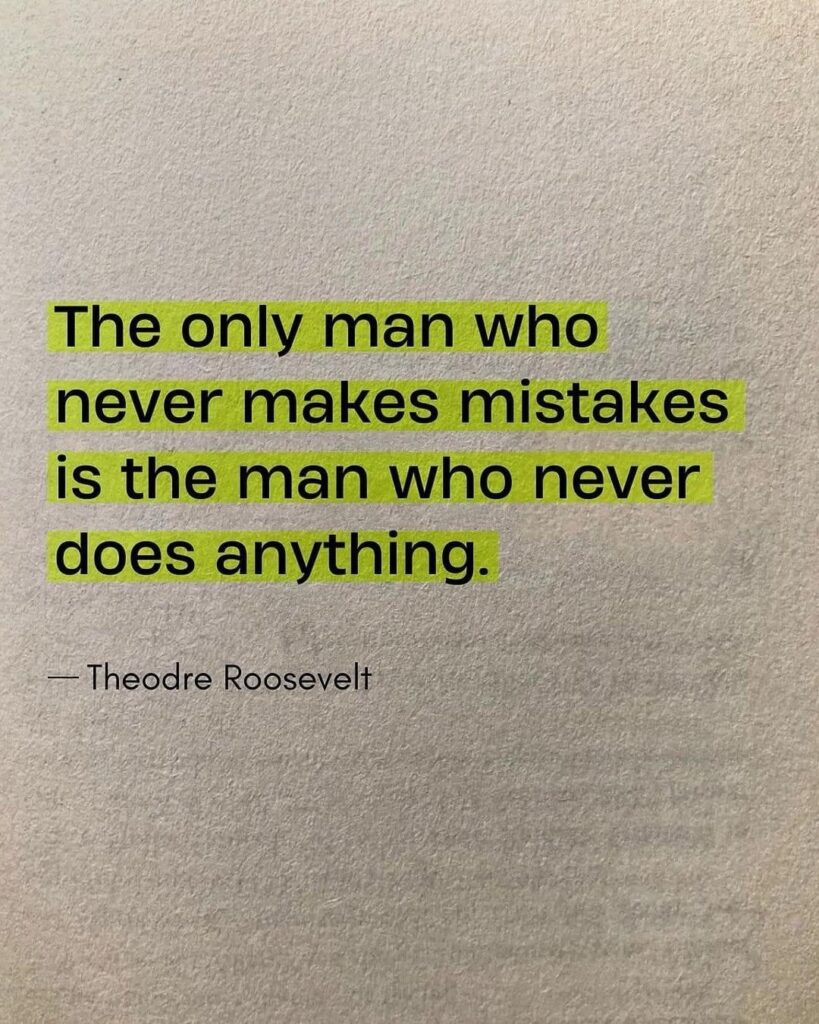Theodore Roosevelt, the 26th President of the United States, was known not just for his political acumen but also for his profound insights into human nature and success. One of his most enduring quotes, “The only man who never makes mistakes is the man who never does anything,” offers a timeless lesson on the importance of action and the inevitability of mistakes in the pursuit of achievement.

The Fear of Failure and Inaction
In today’s world, where success is often glorified, and failure is frowned upon, many people find themselves paralyzed by the fear of making mistakes. This fear can lead to inaction, where individuals choose not to pursue their goals or dreams to avoid the possibility of failure. However, Roosevelt’s quote reminds us that making mistakes is an integral part of doing anything meaningful.
Mistakes as Stepping Stones
Mistakes should not be seen as setbacks but as stepping stones to greater understanding and proficiency. Every error provides valuable lessons that contribute to personal and professional growth. In fact, many successful individuals attribute their achievements to the lessons learned from their failures.
The Value of Experience
Taking action, even if it leads to mistakes, is valuable because it results in experience. Experience is a critical component of success in any field. It is through trying, failing, and learning that individuals gain the insights and skills necessary to navigate complex challenges and eventually succeed.
Encouraging a Culture of Risk-Taking
Roosevelt’s quote also highlights the importance of fostering a culture that encourages risk-taking and learning from mistakes. In both personal and professional settings, creating an environment where individuals feel safe to try new things, even at the risk of failing, can lead to innovation, growth, and improvement.
Theodore Roosevelt’s wisdom reminds us that the path to success is not paved with perfection but with the courage to act and the resilience to learn from mistakes. Embracing this mindset can lead to a more fulfilling and accomplished life, where the fear of making mistakes does not hold us back from pursuing our aspirations. In the end, the only real mistake is choosing not to do anything out of fear of failure.
Q: Is it better to avoid mistakes or to learn from them?
A: It’s far more beneficial to learn from mistakes than to avoid them. Avoiding mistakes often means avoiding new experiences and opportunities for growth. Learning from mistakes, on the other hand, leads to personal development and a deeper understanding of one’s capabilities and limitations.
Q: How can I overcome the fear of making mistakes?
A: Overcoming the fear of making mistakes starts with changing your perspective. View mistakes as opportunities for learning rather than as failures. Setting realistic expectations and understanding that perfection is unattainable can also help. Additionally, practicing self-compassion and reminding yourself that everyone makes mistakes can be beneficial.
Q: Can making mistakes actually lead to success?
A: Absolutely. Many successful people have a history of mistakes and failures behind them. These mistakes provided them with valuable lessons that guided their future decisions and actions, ultimately leading to their success. The key is to analyze and learn from these mistakes to avoid repeating them.
Q: How do I handle criticism or judgment from others when I make a mistake?
A: Handling criticism constructively is crucial. Listen to what others have to say, as there might be valuable feedback hidden in their words. However, it’s also important to distinguish between constructive criticism and mere negativity. Stay confident in your abilities and remember that your worth is not defined by your mistakes.
Q: Should I always take risks to avoid inaction?
A: While taking risks is important, they should be calculated and well-thought-out. Blindly taking risks without considering the consequences can lead to unnecessary problems. Weigh the potential benefits against the risks to make informed decisions.
Q: How can I learn effectively from my mistakes?
A: To learn effectively from mistakes, it’s important to reflect on what went wrong and why. Analyze the situation, understand the factors that contributed to the mistake, and think about what could be done differently next time. Turning these insights into actionable steps is key to improvement.
Q: Does making mistakes mean I’m on the wrong path?
A: Not necessarily. Making mistakes is a natural part of any journey, including the right path. It’s how you respond to and learn from these mistakes that determines whether you’re on the path to success. Remember, progress is rarely a straight line.
As an Amazon Associate we earn from qualifying purchases through some links in our articles.




